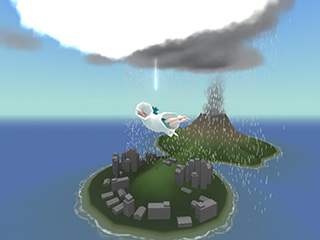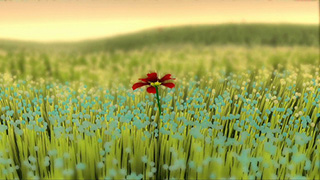Jenova Chen became world famous over night when he released Cloud. A student project followed quickly by another one, a small webgame called flOw. Almost before graduating from game design school, he and his team were picked up by Sony and signed a contract for 3 Playstation Network games. The first one of those, flOw, quickly became the best selling game on that network. The next one, Flower, is in the works. A success story to make any wanna-break-into-the-games-industry-so-badly green with envy.
But Mr. Chen did not achieve this success by safely climbing the ladder that leads from game tester to executive producer. He did it by having a strong artistic vision and the courage to create things out of the ordinary. If games ever become a mature medium, it will be thanks to the likes of him.
Thatgamecompany and Tale of Tales have quite a few things in common. We are both interested in expanding games so that they become more accessible and enjoyable by a wider variety of people. And we both made things that some people are reluctant to even call a game. And that often end up being more relaxing than exciting.
I wish I could call this a battle of the giants. But where we have strong opinions, Mr. Chen has sales figures. So we’ll just hold the microphone in front of his mouth and listen modestly.
China
Tale of Tales (ToT): Tell us a bit about your history. Where were you born? When and why did you move to the USA?

“Cloud” is a popular indie game. And a departure from the norm.
Jenova Chen (JC): I was born in Shanghai China. Born and raised in a middle class family. My Dad worked on one of the earliest giant computers in China, and ended his career in software development and publishing industry. As their only child, my parents put a lot of love/pressure on me. They took me to a special training programs to learn how to program on a computer when I was still in the elementary school. However, at age 10, playing computer games is much more attractive than programming. I ended up trading studying time in exchange for gameplay time with my parents. This worked quite well, while I maintained good GPA, my PC game knowledge accumulates in hundreds (thanks to the piracy :p)
After I entered university, my major was computer science. Due to the past experience, the school work seemed quite easy for me which saved me a lot of time. While I kept playing loads of games, I attended a lot of art classes and did a minor in digital art and design. I was part of a game club where we formed a team of students and made several video games. At the time, there was no education on how to make a game, we ended up ordering books from the US and mimicking popular computer games. I still think those games we made in the university were quite pioneer and technically impressive at the time. However the design of the game was quite cliché.
Upon graduation, I had some “great” ideas for games, I had a computer science degree, but I also had several art awards. I was not quite sure what to do for work. It was difficult for me to find a job where I can do programming, art and game design all together. Therefore I decided to venture to the US, hoping to learn more about digital media and eventually help me spot the ideal job back in China (short sighted, I was). From 2003 to 2006, I studied Interactive Media in the School of Cinematic Arts at University of Southern California, where my life and goal has completely reshaped.

‘Jenova’ vs. ‘milky way’ ;D
ToT: So your family is still in China?
JC: Yes, they are. I’m the only one in my family that came to the US. Though my parents know nothing about video games, they are proud of me now.
ToT: Did you choose the name “Jenova” for yourself or are your parents gamers too?
JC: Chinese parents don’t give their child English names, at least in the 80s. I chose it as my English name when I was still in High school. During our English classes, we were asked to choose English names. My desk-mate and I are both Final Fantasy VII fans. He’s always way into coolness and called himself Cloud. To beat his cockiness, I had to be something much stronger than Cloud. Jenova as the source of tragic in FFVII was chosen for this stupid boyhood reason.
You might want to know why I didn’t use my Chinese name directly. Well, my first name is “Xinghan”, meaning the milky way. However, nobody can remember it or pronounce it. Though I got other English name offers when I entered the US, I found there are simply hundreds Steve Chen and thousands Jason Chen. Instead of being jchen437862 on gmail, it was really a good idea to be the only Jenova Chen. 😀
Choices
ToT: Being a long-time games enthusiast, how come your reflex is not like that of most game designers: to try and make the same kinds of a games as the ones they enjoyed when they were young? Why do you want to make something different?
JC: The truth is I have made too many “me too” games in the past. Chinese people are pretty good at copying others’ work, wink. I’ve already proven to myself that I can make games just like that other game during the college. As a long-time gamer who is nearly bored with most of the mainstream games on the market, my desire is to challenge myself and create something refreshing and different.
“As a long-time gamer who is nearly bored with most of the mainstream games on the market, my desire is to challenge myself and create something refreshing and different.”
JC: I started to want to make video games since I was 15. I was completely moved by several video games I played at the time that I felt almost empty after playing them and started to question myself the meaning of my life. Those games changed my personality and my moral value, to some extent, my life. I was so in awe of the power of those games that I wish one day I can create something equally powerful that inspires and changes others’ life. (in a good way, of course)
However as I grew up and look back at those “powerful” games, the plot and the design of those games seem so generic and naive in many way. I realized the fact that those game were so powerful for me as a kid was because how little I have been exposed, I had nothing to expect by then. Therefore, to create something that is emotionally powerful, simply following the pre-existing formula is not going to work for me and many other players. I need something more and different to impress the grownup gamers.
ToT: You seem to target gamers as your main audience (and I guess publishing to a platform like the PS3 almost forces you to do so). Don’t you feel that a lot of people who currently don’t play computer games (or only casual ones, perhaps) might be interested in your work? More so than in traditional action or strategy games? Is this something you desire? To cater to a non-gaming audience?
Cloud and flOw certainly have attracted many non-gamers. Even today I got an email from a 50 year old gamer complimenting on Cloud. It is a pity that PC gamers can’t play or download PS3 games. Many of them would never afford a PS3. However, as someone who grew up playing video games, who sees more and more kids playing video games everyday everywhere. My main focus is not on the elder generation who don’t play video games.
““I don’t have time to play games any more”, “Games are for kids” are the main problems I feel compelled to resolve.”
This might be cruel, but the future of the video game world lies in the hands of the current and future generations. These are the people who grow up with games as a culture and wanted more out of games as a medium. As we expand the variety of video games, there will be more people finding their places in this medium. Many of us play less and less games as we aging, some of us even stopped playing games.
“I don’t have time to play games any more”, “Games are for kids” are the main problems I feel compelled to resolve. I don’t want to see video games become like toys or superhero comics, which are mainly associated with kids and teenagers. I want to see video games become a universal art form and a mature entertainment medium like film where the young and the old can both find their places in.
ToT: The games you have made so far are short and minimal. Has this been an artistic choice or more something that was influenced by circumstance?
JC: Due to the nature of a project started in the school, the project can’t be very big. And the fact that thatgamecompany was founded by two students right out of the grad school, you can imagine how hard it was to get funding. The small scope indicates small budget which helped reduce the risk and concerns from the publisher. Without the digital distribution, there was simply no space for small developers like us in the console world. However, being small is also an artistic choice due to the fact we are creating brand new experiences. If you are going to an exotic restaurant, we offer you a tasting menu.
Emotions
ToT: In other interviews you have talked about expanding the kinds of emotions that games as a medium can evoke and provoke. So far, you seem to have focused on making games that feel relaxing and peaceful. Was this on purpose?
JC: Our purpose is to expand the spectrum of emotions in games, which will allow more audience to enjoy video games as a medium. The fact Cloud and flOw are both relaxing and peaceful is for the purpose of exaggerating the emotional differences in contrast to mainstream games, most of which are stressful and violent. People can easily tell the differences between “red” and “blue”. If we made a game that is “purple”, you might miss the point.
While Cloud was made to be the opposite of mainstream violent video games on purpose, flOw was not. flOw is a game created to test my active dynamic difficulty adjustment design philosophy, it was made to help both gamers and non-gamers to enjoy the game in their own paces and ways. The game is about evolution and eating, the most ancient form of violence.  Yes, I could make the game more like Pacman. But if I did so the gamers would instantly know what to do in the game, while the non-gamers might not. In order to create a fair start between gamer and non-gamer, I wanted flOw to be a completely fresh and new experience so that both groups feel excited to explore without preexisting knowledge. That’s how the abstract aquatic world was chosen.
Yes, I could make the game more like Pacman. But if I did so the gamers would instantly know what to do in the game, while the non-gamers might not. In order to create a fair start between gamer and non-gamer, I wanted flOw to be a completely fresh and new experience so that both groups feel excited to explore without preexisting knowledge. That’s how the abstract aquatic world was chosen.
ToT: Do you have any desires or plans for working with other emotions, different atmospheres?
JC: While my goal is to make more games with different feels that the current game market is not offering, I never intended to repeat the emotion subject in our games. Even between Cloud and flOw, two relaxing games, the feeling was quite different. And we always address different themes and subjects in our games. It’s unlikely for them to be the same.
“…when I work on games, I always start from a message and a feeling.”
ToT: You talk about dealing with different emotions in a very objective way. But is there anything that you personally want to say with your work? Do you have a kind of message for your audience? Something you want to give/tell them?
JC: I am quite rational when I talk about methodologies and theories. However, when I work on games, I always start from a message and a feeling. Most of the inspirations and ideas are from my personal experience. I used to have asthma, and was often sick during my childhood. I went to hospital very often and liked to day dream while waiting to see the doctors. If you played Cloud, you can see exactly why the game is designed the way it is. flOw was a direct product out of my digestion on Mihaly Csikszentmihalyi’s wonderful psychology book. Its art style was inspired by many BBC documentary and Apple’s iPod commercials. Yes, iPod. Without a constant source of knowledge, it will be impossible for me to come up new ideas. Luckily, I’m still learning and accumulate experiences.
Narrative and beauty
ToT: How do you feel about narrative in games? Your games seem very focused on mechanics and mood. There’s a lot of potential for narrative in them, but it is rarely used. The poetry and symbolism of clouds was mostly ignored in Cloud, the aggression and cannibalism of Flow was not part of its story, and Flower seems to go in a similar direction.
“I also see entertainment as an emotional food for people who desire for certain feelings (not stories).”
JC: Graduated from a film school, learned screen writing and watched countless films and screenplays. I should be the one who raise the flag for narratives. However, having a much closer look behind the craft of storytelling, I found the magic to make a powerful film is not just about what happened in the narrative, it has a lot to do how the story is told to the audience. Namely, the way to utilize visual, sound and performance to move the audience.
I also see entertainment as an emotional food for people who desire for certain feelings (not stories). Music has almost no narrative, yet it is still one of the most efficient medium to create emotional response. Story as a vessel is also a quite powerful tool to convey emotions. It is so far the most effective mechanics to have audience invested into the characters which is more likely to create a deeper more complicated emotional response.
In fact, there is a story in Cloud which is essential to create the premise and help player to be emotionally invested. But the focus of the game is on the freedom of flight and the imaginative fantasy of shaping the Clouds. Too much story about the character might distract the player from the core experience.

In “Flower” you float with petals on the wind.
Overall, I’m not a good writer, or a fully trained narrative designer. I was trained to express through visual, sound and interactions as an interactive media artist. I could only focus on one thing at a time. Between an elaborate story and an emergent and emotional interaction between the player and the game, I would always choose spending more effort on the latter.
ToT: Your games are beautiful. They are very carefully designed, aesthetically. In a macho-dominated games culture, this is often considered mere eye candy, and not essential to the experience. How do you feel about that? (given that, for instance, non-interactive art is often simply enjoyed and praised only for its beauty)
JC: We didn’t design our game to be beautiful just for the sake of being pretty. I think that’s why many gamers considered over-decorated visuals eye candies. If we make something beautiful, it’s likely that we wanted to communicate to the player about our message. If the goal of the game is to make player aware of the beauty of something in our daily life, we will certainly make it as beautiful as possible. The macho-dominated games are less likely to deal with messages about enjoy the beauties, except DOA extreme beach volleyball maybe :p
Design
“If you are going to an exotic restaurant, we offer you a tasting menu.”
ToT: In terms of structure, so far, your games have been rather traditional. The only real difference has been that the rules in your designs are not so strict. You don’t punish players and mistakes don’t feel so bad. Why do you feel that such a traditional game structure (of challenge-action-reward-progress) is important to the interactive experience?

A still moment from thatgamecompany’s “Flower”
JC: Our focus is on innovating the feelings a game can evoke. Sometimes when an emotion is so new, we have to innovate on the technology and mechanics in order to pull the feeling off. Other times, we don’t have to. Meanwhile we are also confronting the challenge to break our player’s expectations. Looking back to the history, any innovation and invention took us years to adapt. It is much easier to accept something new while it is still familiar. We could make something completely different from its feeling to its structure, but it is certainly going to be confusing and likely to be rejected by the majority. In fact, even flOw and Cloud are on a fine line today. There are quite a few people who considered them as anything but games.
ToT: How do you respond when people say that Flow is not a game?
JC: It’s both a praise and a challenge. It means we’ve done something completely new so that people will even consider it not a game. Meanwhile it also means in order to help more people understand and appreciate the games we are making, we need to be more diligent to communicate and touch them.
Interview conducted via email by Michaël Samyn in just a few days in March 2008, after meeting and talking with Mr. Chen and his team at the Game Developers Conference in San Francisco. The text has been rearranged for storytelling purposes.


“I also see entertainment as an emotional food for people who desire for certain feelings (not stories).”
I feel the same way towards music. I don’t want to just make “songs” I want to make feelings that exist outside of the realm of standard pop formulas.
Great interview!!
I’m studing history of art and always tougth that videogames are another kind of art, like films, painting,…
good luck!
“I found the magic to make a powerful film is not just about what happened in the narrative, it has a lot to do how the story is told to the audience. Namely, the way to utilize visual, sound and performance to move the audience.”
Wonderful interview.
This is the guy I agree with the most. And this is why in my opinion interactivity or gameplay should be a major focus, or even the centrifugal inspiration for any project.